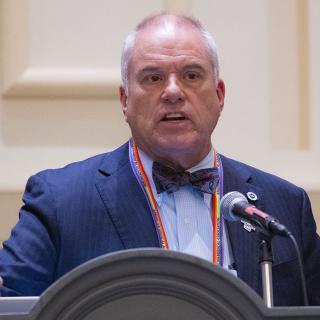As a hospitalist in California, Donaldo Hernandez, MD, has frequently seen the confusion patients experience over who is coming into their hospital room to provide treatment.
Many people are wearing long coats or are dressed in scrubs. Combine that with patients being confused because of the impact that medications or their illness is having on them and, as studies have shown, it’s hard for them to know who is leading their care.
That’s why it is important that MDs and DOs are the only ones calling themselves “doctor,” said Dr. Hernandez. He is immediate past president of the California Medical Association and spoke during the Litigation Center of the American Medical Association and State Medical Societies’ Open Meeting at the 2023 AMA Interim Meeting.
“Individuals that come into that environment calling themselves doctor can confuse the patient and can create safety issues and issues surrounding confidentiality and on and on it goes,” Dr. Hernandez said. “So, the term doctor in that context becomes incredibly important.” It is essential, he added, to “maintain that individuality with who in the care team is providing care and who is leading that team.”
And that is why it’s crucial, Dr. Hernandez said, that the AMA Litigation Center and the California Medical Association made the physician voice heard through an amicus brief filed in a lawsuit in which three nurse practitioners who earned doctorates of nursing practice sued the state of California. The plaintiffs are saying a state statute that only allows California-licensed allopathic and osteopathic physicians to use the term “doctor” and “Dr.” is unconstitutional because it infringes on free speech rights.
In September the U.S. District Court for the Central District of California Riverside Division dismissed two of the three plaintiffs from the lawsuit, Palmer v. Bonta, saying they didn’t have legal standing to bring the lawsuit. But the third plaintiff remains and the case continues to move forward.
Fighting scope creep is a critical component of the AMA Recovery Plan for America’s Physicians.
Patients deserve care led by physicians—the most highly educated, trained and skilled health professionals. The AMA vigorously defends the practice of medicine against scope of practice expansions that threaten patient safety.
Ever-growing scope creep
Despite nurse practitioners’ not receiving the rigorous training that allopathic and osteopathic physicians receive or having the ongoing testing requirements that physicians have, California lawmakers recently passed a bill that will allow some nurse practitioners to practice without physician oversight.
As scope creep continues, patients, for their safety, need to know who the physician is, Dr. Hernandez said.
“We do believe in a team based-approach. We think it’s important that teams exist. That’s borne out in the literature as well. But that team has to have a leader and that leader needs to be a physician—bottom line. Full stop,” he said.
So, while Dr. Hernandez is happy to extend the courtesy of calling an astronomer, or doctor of philosophy or doctor of economics a “doctor” when they come into the hospital, he said it isn’t an appropriate term to use for nonphysicians in a health care setting.
“When you are providing care, when you are in the environment where you need to be the person that they look at and say ‘you are the individual who is going to be in charge of my care,’ that has to be a physician and that honorary is designated by the term doctor,” he said.
Find out more about the cases in which the AMA Litigation Center is providing assistance and learn about the Litigation Center’s case-selection criteria.




